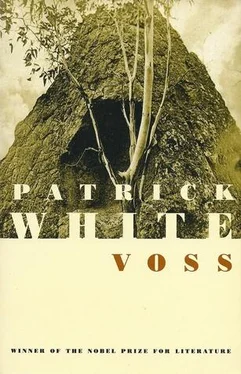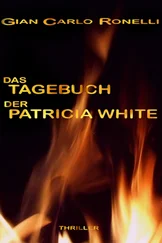The country round them reduced most personal hopes and fears until these were of little account. An eternity of days was opening for the men, who would wake, and scramble up with a kind of sheepish respect for their surroundings. Dew was clogging the landscape. Spiders had sewn the bushes together. And then there were those last, intolerably melancholy stars, that cling to a white sky, and will not be put out except by force.
After breakfast, which was similar to other meals, of salt meat, or of meat lately killed, with the tea they made from scum of waterholes, or from the same stuff brought on in canvas, Voss, attended by Judd, would take readings from their instruments, and attempt to assess their current position. Judd would bring out from their cloths those trembling devices in glass and steel and quicksilver. Judd was the keeper of instruments, Voss indulging his subordinate’s passion with the kindness of a superior being. He himself would sit with the large notebook upon his knees, recording in exquisite characters and figures, in black ink, the legend. Sometimes similarly black, similarly exquisite spiders replete from their dew-feast, would trample in his hair, and have to be brushed off. These small insects could affront him most severely. By this time the air was no longer smelling of dew; it had begun again to smell of dust. Men were buckling girths, and swearing oaths through thinner lips. As the sun mounted, the skin was tightening on their skulls. Some of them winced, and averted their eyes from those flashing instruments with which Voss and Judd professed to be plotting, in opposition to Providence. The sceptics would ride on, however, because they were committed to it, and because by now their minds and limbs had accepted a certain ritual of inspired motion.
So they advanced into that country which now possessed them, looking back in amazement at their actual lives, in which they had got drunk, lain with women under placid trees, thought to offer their souls to God, or driven the knife into His image, some other man.
Then, suddenly, Voss looked in his journal and saw that the following day would be Christmas. By some instinct for self-preservation, he would not have spoken of it, and most of his men, dependent on him for every judgement or calculation, would have ridden quietly by.
Palfreyman realized, but as he was not a man to act, an observer, rather, or sufferer of life, he was waiting to see.
If, in the case of Voss, it was the instinct for self-preservation that warned him to avoid Christmas, in Judd’s case it was the instinct for self-assertion that caused him to remember. Since his death by whips and iron, he had aspired longingly at times to be reborn, and when more hopefully than at that season, at which, he sensed now, they had arrived. If he had not succeeded all those years, in the loving bosom of his family, it was perhaps because he was shy of eyes that had witnessed something of his sufferings. But to these mates, and even to the knowing German, he was a stone man. Then it would be easier, given the opportunity, to crack open and disclose all manner of unexpected ores, even a whole human being.
So the emancipist was expectant. He was always urging his horse forward, and hesitating, and reining it back. He must only choose the moment, but would speak soon, he knew. His shirt was shining and transparent with sweat, over the old wounds, and clumsy labouring of great ribs, as he tidied the edges of his mob of cattle, and watched the point at which the German was riding with Mr Palfreyman. The backs of the two gentlemen ahead remained quite flat and unconscious, while the figure of Judd, labouring always with his cattle and his thoughts, loomed like sculpture.
They had entered, as it happened, a valley sculptured in red rock and quartz, in which a river ran, rather shallow and emotional, but a river of live water such as they could remember, through the valley of wet grass. Heat appeared to intensify the green of a variety of splendid trees, some sprouting with hair or swords, others slowly succumbing to a fleshy jasmine, of which the arms were wound round and round their limbs. These deadly garlands were quite festive in immediate effect, as they glimmered against the bodies of their hosts. The breath of jasmine cajoled the air. Platters of leaves presented gifts of moisture. And there were the birds. Their revels were filling the air with cries and feathers, rackety screams of utter abandon, flashes of saffron, bursts of crimson, although there were also other more sombre birds that would fly silently into the thoughts of men like dreadful arrows.
When it was almost noon, and the valley had narrowed to a neck, the convict left his cattle, which were tired and unwilling, and rode forward.
He said:
‘Mr Voss, I reckon it is near Christmas. If it is not tomorrow, it is soon after.’
Then they listened to the silence.
If he had been given to irony, Palfreyman would have indulged in it at this point, but as he was not, he looked at the grass, and waited.
‘Yes, you are correct, Judd,’ said Voss.
The birds were screaming and ascending in red riot.
‘It is tomorrow,’ said the German precisely.
All round this group hung the heat in sheets of damp silence.
‘It did not occur to me to mention it,’ said Voss. ‘You know, in such circumstances.’
He let his hand fall limply, as if his own body were as much to blame.
‘But if this festival will mean anything to you, Judd, personally, or to any of the other men, then certainly must we celebrate it.’
‘I would like to celebrate Christmas, sir,’ said Judd.
Once he would have looked to Palfreyman, even last week he might have, but did not now. This rather massive man, sitting astride his caked horse, was not in need of support for the present.
Instead, it was Palfreyman who felt the need to follow. He hastened to add:
‘I, too, would like to celebrate Christmas.’
It was perfectly natural that any Christian should wish to join the emancipated convict at this season of complete emancipation, yet Voss, who feared union, most of all one in which he himself might become involved, suspected snares.
‘Good,’ he said, wetting his lips, and smiling painfully. ‘Then, what would you suggest, Judd?’
He waited to hear something he would hate.
‘I would suggest, sir, that we call a halt just where we are. It is a pleasant spot,’ the convict said, and indeed, it was reflected in his face, a place of large leaves and consoling water. ‘If you agree, I will kill a sheep, that we will eat tomorrow. I will make a pudding or two, not the real thing, like, but to deceive ourselves. I am not going to suggest, sir, how we should spend Christmas Day. Every man will have his own ideas.’
‘We could read the service,’ he did add, as a careful after-thought.
‘Let us, at least, call the halt,’ said Voss, and, riding into the shadow of a tree, flung his hat down, then himself.
Judd took command. His face was glad, Palfreyman saw. Calling to his mates as they approached, throwing out his thick, hairy arm, signalling to them to dispose of beasts and baggage in a final halt, the convict had become a man of stature. Little signs of hopefulness were playing round his mouth amongst the lively points of perspiration. The strength of innocence can but increase, Palfreyman realized, and was himself glad.
Then, as he was exhausted by the luxuriance of unwonted green, by the habitual heat, as well as by the challenge of souls that he had just witnessed, the ornithologist went and joined the German in the shadow of his tree.
‘It is not splendid?’ asked Voss, admiring the prospect of sculptural red rocks and tapestries of musical green which the valley contained.
Palfreyman agreed.
Читать дальше












